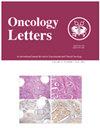Impact of ACEI/ARB use on the survival of hypertensive patients with cancer: A meta‑analysis.
IF 2.5
4区 医学
Q3 ONCOLOGY
引用次数: 0
Abstract
Angiotensin-converting enzyme inhibitors (ACEIs) and angiotensin receptor blockers (ARBs) are commonly used antihypertensive drugs. However, the impact that the use of ACEI and ARB drugs will have on the survival of patients with hypertension and cancer is still unclear. Therefore, the present study aimed to investigate the effects of ACEI and ARB use on the survival of patients with cancer. The Embase, PubMed and Web of Science databases were used to systematically analyze the survival of hypertensive patients with cancer treated with ACEIs or ARBs. Hazard ratios (HRs) and 95% confidence intervals (CIs) were calculated to evaluate the association between ACEI and ARB use and patient survival. The relationship between the survival of patients with certain types of cancer and ACEI and ARB use was evaluated using the calculated HRs. Patients with ovarian, pancreatic, prostate, hepatocellular, lung, esophageal, gastric, colon, nasopharyngeal, head and neck tumors, gallbladder and rectal cancers that used ACEI and ARB analogs had significantly increased survival times, except for patients with breast cancer (HR, 1.04; 95% CI, 0.90-1.19; P<0.01) and uroepithelial carcinoma (HR, 1.15; 95% CI, 0.69-1.94; P<0.01), who had significantly decreased survival times, when compared with patients who did not use these drugs. Analysis of the relationship between the use of ACEIs or ARBs alone or in combination on the overall survival of hypertensive patients with cancer demonstrated that the use of ACEIs alone (HR, 1.00; 95% CI, 0.93-1.08; P<0.01) did not have a significant effect on the survival of these patients. By contrast, the survival time was increased in hypertensive patients with cancer who used either ARBs alone (HR, 0.89; 95% CI, 0.84-0.94; P<0.01) or a combination of ACEIs and ARBs (HR, 0.84; 95% CI, 0.78-0.91; P<0.01). The present meta-analysis demonstrated the potential effects of ACEI and ARB use on the overall survival of patients with cancer. Therefore, investigation of the underlying mechanisms of action of ACEIs and ARBs, as well as the identification of specific groups of patients who may benefit from these interventions, could potentially lead to novel therapeutic options and improve the prognosis of patients with cancer in the future.使用 ACEI/ARB 对癌症高血压患者生存期的影响:荟萃分析
血管紧张素转换酶抑制剂(ACEI)和血管紧张素受体阻滞剂(ARB)是常用的降压药。然而,使用血管紧张素转换酶抑制剂(ACEI)和血管紧张素受体阻滞剂(ARB)对高血压合并癌症患者的生存期有何影响仍不清楚。因此,本研究旨在调查使用 ACEI 和 ARB 对癌症患者生存期的影响。本研究利用 Embase、PubMed 和 Web of Science 数据库对接受 ACEIs 或 ARBs 治疗的高血压癌症患者的生存率进行了系统分析。通过计算危险比(HRs)和95%置信区间(CIs)来评估ACEI和ARB的使用与患者生存率之间的关系。使用计算出的 HRs 评估了某些类型癌症患者的生存率与 ACEI 和 ARB 使用之间的关系。使用 ACEI 和 ARB 类似物的卵巢癌、胰腺癌、前列腺癌、肝癌、肺癌、食管癌、胃癌、结肠癌、鼻咽癌、头颈部肿瘤、胆囊癌和直肠癌患者的生存时间明显延长,但乳腺癌患者除外(HR,1.04;95% CI,0.90-1.19;P<0.01)和尿路上皮癌(HR,1.15;95% CI,0.69-1.94;P<0.01)患者与未使用这些药物的患者相比,生存时间明显缩短。分析单独或联合使用 ACEIs 或 ARBs 与高血压癌症患者总生存期之间的关系表明,单独使用 ACEIs(HR,1.00;95% CI,0.93-1.08;P<0.01)对这些患者的生存期没有显著影响。相比之下,单独使用 ARBs(HR,0.89;95% CI,0.84-0.94;P<0.01)或联合使用 ACEIs 和 ARBs(HR,0.84;95% CI,0.78-0.91;P<0.01)的癌症高血压患者的生存时间延长。本荟萃分析表明,使用 ACEI 和 ARB 对癌症患者的总生存期有潜在影响。因此,研究 ACEIs 和 ARBs 的潜在作用机制,并确定可能从这些干预措施中获益的特定患者群体,有可能为癌症患者带来新的治疗选择,并在未来改善癌症患者的预后。
本文章由计算机程序翻译,如有差异,请以英文原文为准。
求助全文
约1分钟内获得全文
求助全文
来源期刊

Oncology Letters
ONCOLOGY-
CiteScore
5.70
自引率
0.00%
发文量
412
审稿时长
2.0 months
期刊介绍:
Oncology Letters is a monthly, peer-reviewed journal, available in print and online, that focuses on all aspects of clinical oncology, as well as in vitro and in vivo experimental model systems relevant to the mechanisms of disease.
The principal aim of Oncology Letters is to provide the prompt publication of original studies of high quality that pertain to clinical oncology, chemotherapy, oncogenes, carcinogenesis, metastasis, epidemiology and viral oncology in the form of original research, reviews and case reports.
 求助内容:
求助内容: 应助结果提醒方式:
应助结果提醒方式:


